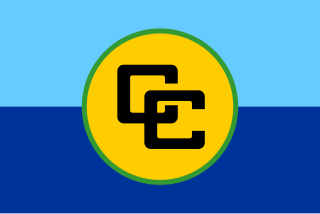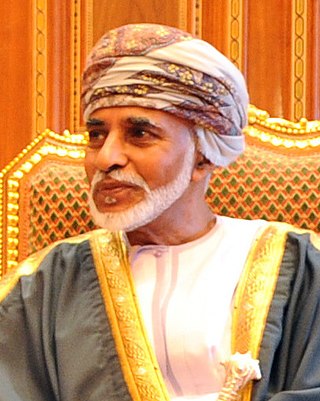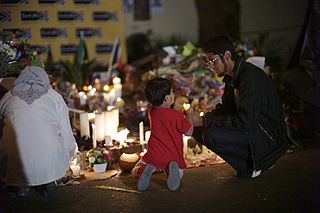An international day of mourning is a day, or one of several days, marked by mourning and memorial activities observed among countries under an intergovernmental organization. They are designated by the intergovernmental organization. Such days include those marking the death or funeral of a renowned individual or individuals from a country of that organization or elsewhere or the anniversary of such a death or deaths, the anniversaries of a significant natural or man-made disaster occurring in the country of the organization, wartime commemorations or in memory of the victims of a terrorist attack. Common symbols include flying the organization's flag at half-mast and observing minutes of silence.
The concept was first introduced by European Commission in September 2001 after the terrorist attacks in the United States. The commission, together with the European Council and the European Parliament, designated 14 September 2001 as a day of mourning in member states and EU institutions. European citizens were asked to join in three minutes of silence. [1] [2] The Arab League observed three days of mourning for the death of King Fahd of Saudi Arabia on 4 August 2005. [3] After these, many organizations observed day of international mourning for several times.

The Caribbean Community is an intergovernmental organisation that is a political and economic union of 15 member states and five associated members throughout the Americas, The Caribbean and Atlantic Ocean. It has the primary objective to promote economic integration and cooperation among its members, ensure that the benefits of integration are equitably shared, and coordinate foreign policy. The organisation was established in 1973, by its four founding members signing the Treaty of Chaguaramas. Its primary activities involve:

Mourning is the emotional expression in response to a major life event causing grief, especially loss. It typically occurs as a result of someone's death, especially a loved one.

Qaboos bin Said Al Said was Sultan of Oman from 23 July 1970 until his death in 2020. A fifteenth-generation descendant of the founder of the House of Al Said, he was the longest-serving leader in the Middle East and Arab world at the time of his death, having ruled for almost half a century.
A supranational union is a type of international organization and political union that is empowered to directly exercise some of the powers and functions otherwise reserved to states. A supranational organization involves a greater transfer of or limitation of state sovereignty than other kinds of international organizations.

Sheikh Khalifa bin Zayed bin Sultan Al Nahyan was the second president of the United Arab Emirates and the ruler of Abu Dhabi, serving from November 2004 until his death in May 2022.

Half-mast or half-staff refers to a flag flying below the summit of a ship mast, a pole on land, or a pole on a building. In many countries this is seen as a symbol of respect, mourning, distress, or, in some cases, a salute.
A national day of mourning is a day, or one of several days, marked by mourning and memorial activities observed among the majority of a country's populace. They are designated by the national government. Such days include those marking the death or funeral of a renowned individual or individuals from that country or elsewhere or the anniversary of such a death or deaths, wartime commemorations, or the occurrence or anniversary of a significant disaster either in the country or in another country. Flying a national or military flag of that country at half-mast is a common symbol.

Rupiah Bwezani Banda was a Zambian politician who served as the fourth president of Zambia from 2008 to 2011, taking over from Levy Mwanawasa. Banda was an active participant in politics from early in the presidency of Kenneth Kaunda, during which time he held several diplomatic posts.

Regional organizations (ROs) are, in a sense, international organizations (IOs), as they incorporate international membership and encompass geopolitical entities that operationally transcend a single nation state. However, their membership is characterized by boundaries and demarcations characteristic to a defined and unique geography, such as continents, or geopolitics, such as economic blocs. They have been established to foster cooperation and political and economic integration or dialogue among states or entities within a restrictive geographical or geopolitical boundary. They both reflect common patterns of development and history that have been fostered since the end of World War II as well as the fragmentation inherent in globalization, which is why their institutional characteristics vary from loose cooperation to formal regional integration. Most ROs tend to work alongside well-established multilateral organizations such as the United Nations. While in many instances a regional organization is simply referred to as an international organization, in many others it makes sense to use the term regional organization to stress the more limited scope of a particular membership.

The second President of Gabon, Omar Bongo, died in Spain on 8 June 2009, after having suffered from colorectal cancer. A month of mourning and state funeral, spanning 11 to 18 June, followed.

Sabah Al-Ahmad Al-Jaber Al-Sabah was the Emir of Kuwait from 24 January 2006 until his death in 2020.

The death of Hugo Chávez, 45th president of Venezuela, was announced by government officials to have been on 5 March 2013 at 16:25 VET in Caracas, Venezuela from cancer at the age of 58. His death triggered a presidential election which was constitutionally required to be called within 30 days.

On 5 December 2013, Nelson Mandela, the first president of South Africa to be elected in a fully representative democratic election, as well as the country's first black head of state, died at the age of 95 after a prolonged respiratory infection. He died at around 20:50 local time (UTC+2) at his home in Houghton, Johannesburg, surrounded by family. His death was announced by President Jacob Zuma on national television at 23:45. Reactions from governments, international organisations, and notable individuals, gained worldwide media coverage.

Mao Zedong, the founder of the People's Republic of China (PRC) and Chairman of the Chinese Communist Party, died on 9 September 1976 at the age of 82, following a period of ill health. The government ordered a week of national mourning following his death.

A European Day of Mourning is a day marked by mourning and memorial activities in member states of the European Union. They are declared by the union and are separate from national days of mourning, which are designated at the national level. As of February 2023, there have been three European Days of Mourning.
Hafez al-Assad, the 18th president of Syria, died from a heart attack on 10 June 2000 at the age of 69. His funeral was held three days later in Damascus, and he was buried in a mausoleum in his hometown Qardaha in Latakia Governorate, beside his eldest son Bassel al-Assad who died in 1994.
Elizabeth II, Queen of the United Kingdom and the other Commonwealth realms, died on 8 September 2022, at the age of 96, leading to reactions from around the world. The new king, Charles III, paid tribute to his "darling Mama" in an address to the nation and Commonwealth the next day. Politicians throughout the Commonwealth paid tribute to the Queen, praising her long public service. Political figures of the rest of the world also offered their condolences and tributes, as did members of royal families, religious leaders and other public figures.
An Arab League Day of Mourning is a day marked by mourning and memorial activities in member states of the Arab League. They are declared by the union and are separate from national days of mourning, which are designated at the national level. As of October 2023, the Arab League has declared Days of Mourning four times.